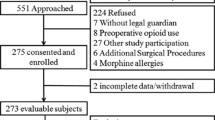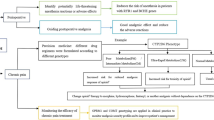Abstract
Background: There is much variation in the response of both individuals and different ethnic populations to opioids, with genetic differences being responsible for interindividual variation. The m-opioid receptor single nucleotide polymorphism (rs number 1799971) at nucleotide position 118 (OPRM1 118A>G) affects the analgesic response to opioids.
Objective: This study aimed to investigate the association between the OPRM1 118A>G polymorphism and the effects of fentanyl-induced analgesia, respiratory depression, and anesthetic recovery responses in a population of Han Chinese patients.
Study Design: The study was a case series in a hospital setting, with 1 year of study and 1 year of follow-up. A total of 189 patients (92 males and 97 females; American Society of Anesthesiologists Physical Status I or II, Glasgow Coma Scale = 15) who were scheduled for laparoscopic abdominal surgery received intravenous midazolam (Versed®) 0.08-0.01 mg/kg and fentanyl (Duragesic®) 5.0 μg/kg. The main outcome measure was the degree of postoperative pain, as assessed using the Visual Analog Scale (VAS). VAS scores were recorded 5, 15, 30, 45, and 60 minutes after a fentanyl bolus injection in the post-anesthesia care unit (PACU). The minute expiratory volume, end-tidal carbon dioxide concentration (EtCO2) and respiratory rate (RR) were measured continuously. The incidence of fentanyl-induced respiratory depression (RR <8/min and EtCO2 >45 mmHg) was recorded at its appearance and treated with respiratory assistance. Blood gas analysis was done 15, 30, 45, and 60 minutes after extubation. These parameters were correlated with genotyping results of genomic DNA extracted from whole blood.
Results: Patients with the OPRM1 118 AG or GG genotypes had significantly higher VAS pain scores 15 and 30 minutes after a fentanyl bolus injection in the PACU than AA genotype patients (p <0.05). A small but statistically significant difference was observed between the 118 AA and 118 AG/GG genotypes with regard to the carbon dioxide arterial pressure (PaCO2) at 15 and 30 minutes from the fentanyl bolus injection after extubation (p < 0.05); however, no clinically significant difference in the frequency of respiratory depression was seen. Homozygous 118 GG genotype patients had a significantly shorter time to awakening (p = 0.018) and extubation (p = 0.024) than patients with the 118 AA genotype. When the 118 GG and 118 AG genotypes were combined for analysis, a significantly shorter time to awakening (p = 0.011) and extubation (p = 0.010), compared with the 118 AA genotype, was also seen.
Conclusion: The OPRM1 118A>G polymorphism lessens the analgesic response to fentanyl and the time to awakening and extubation but has no clinically significant effect on the incidence of respiratory depression.





Similar content being viewed by others
References
Meyer UA. Overview of enzymes of drug metabolism. J Pharmacokinet Biopharm 1996; 24: 449–59
Ingelman-Sundberg M. Functional consequences of polymorphism of xenobiotic metabolizing enzymes. Toxicol Lett 1998; 102-103: 155–60
Wang JB, Imai Y, Eppler CM, et al. mu opiate receptor: cDNA cloning and expression. Proc Natl Acad Sci U S A 1993; 90: 10230–4
Uhl GR, Sora I, Wang Z. The mu opiate receptor as a candidate gene for pain: polymorphisms, variations in expression, nociception, and opiate responses. Proc Natl Acad Sci U S A 1999; 96: 7752–5
Bond C, LaForge KS, Tian M, et al. Single nucleotide polymorphism in the human mu opioid receptor gene alters beta-endorphin binding and activity: possible implications for opiate addiction. Proc Natl Acad Sci U S A 1998; 95: 9608–13
Hoehe MR, Kopke K, Wendel B, et al. Sequence variability and candidate gene analysis in complex disease: association of mu opioid receptor gene variation with substance dependence. Hum Mol Genet 2000; 9: 2895–908
Huang C-J, Liu H-F, Su Y-W, et al. Association between human opioid receptor genes polymorphisms and pressure pain sensitivity in females. Anaesthesia 2008; 63: 1288–95
Koch T, Kroslak T, Averbeck M, et al. Allelic variation S268P of the human mu-opioid receptor affects both desensitization and G protein coupling. Mol Pharmacol 2000; 58: 328–34
Befort K, Filliol D, Decaillot FM, et al. A single nucleotide polymorphic mutation in the human mu-opioid receptor severely impairs receptor signaling. J Biol Chem 2001; 276: 3130–7
Margas W, Zubkoff I, Schuler HG, et al. Modulation of Ca2+ channels by heterologously expressed wild-type and mutant human μ-opioid receptors (hMOR) containing the A118G single nucleotide polymorphism. J Neurophysiol 2007; 97: 1058–67
Lötsch J, Geisslinger G. Are μ-opioid receptor polymorphisms important for clinical opioid therapy? Trends Mol Med 2005; 11: 82–9
Klepstad P, Rakvag TT, Kaasa S, et al. The 118 A > G polymorphism in the human μ-opioid receptor gene may increase morphine requirements in patients with pain caused by malignant disease. Acta Anaesthes Scand 2004; 48: 1232–9
Landau R, Kern C, Columb MO, et al. Genetic variability of the mu opioid receptor influences intrathecal fentanyl analgesic requirements in laboring women. Pain 2008; 139: 5–14
Sia AT, Lim Y, Goh RW, et al. A118G single nucleotide polymorphism of human mu-opioid receptors gene influences pain perception and patient-controlled intravenous morphine consumption after intrathecal morphine for postcesarian analgesia. Anethesiology 2008; 109: 520–6
Gelernter J, Kranzler H, Cubells J. Genetics of two mu opioid receptor gene (OPRM1) exon I polymorphisms: population studies and allele frequencies in alcohol- and drug-dependent subjects. Mol Psychiatry 1999; 4: 476–83
Szeto CY, Tang NL, Lee DT, et al. Association between mu opioid receptor gene polymorphisms and Chinese heroin addicts. Neuroreport 2001; 12: 1103–6
Tan EC, Chong SA, Mahendran R, et al. Mu opioid receptor gene polymorphism and neuroleptic-induced tardive dyskinesia in patients with schizophrenia. Schizophr Res 2003; 65: 61–3
Bart G, Heilig M, LaForge KS, et al. Substantial attributable risk related to a functional mu-opioid receptor gene polymorphism in association with heroin addiction in Central Sweden. Mol Psychiatry 2004; 9: 547–9
Kim SG, Kim CM, Kang DH, et al. Association of functional opioid receptor genotypes with alcohol dependence in Koreans. Alcohol Clin Exp Res 2004; 28: 986–90
Oertel BC, Kettner M, Scholich K, et al. A common human micro-opioid receptor genetic variant diminishes the receptor signaling efficacy in brain regions processing the sensory information of pain. J Biol Chem 2009; 284: 6530–5
Zhang Y, Wang D, Johnson AD, et al. Alellic expression imbalance of human mu opioid receptor (OPRM1) caused by variant A118G. J Biol Chem 2005; 280: 32618–24
Fillingim RB, Kaplan L, Ness TJ, et al. The A118G single nucleotide polymorphism of the μ-opioid receptor gene (OPRM1) is associated with pressure pain sensitivity in humans. J Pain 2005; 6: 159–67
Janicki PK, Schuler G, Francis D, et al. A genetic association study of the functional A118G polymorphism of the human μ-opioid receptor gene in patients with acute and chronic pain. Anesth Analg 2006; 103: 1011–7
Chou WY, Yang LC, Lu HF, et al. Association of mu-opioid receptor gene polymorphism (A118G) with variations in morphine consumption for analgesia after total knee arthroplasty. Acta Anesthesiol Scand 2006; 50: 787–92
Cheng KI, Lin SR, Chang LL, et al. Association of the functional A118G polymorphism of OPRM1 in diabetic patients with foot ulcer pain. J Diabetes Complications. Epub 2009 Mar 18
Hayashida M, Nagashima M, Satoh Y, et al. Analgesic requirements after major abdominal surgery are associated with OPRM1 gene polymorphism genotype and haplotype. Pharmacogenomics 2009; 9: 1605–16
Romberg RR, Olofsen E, Bijl H, et al. Polymorphism of mu-opioid receptor gene (OPRM1:c.118A>G) does not protect against opioid-induced respiratory depression despite reduced analgesic response. Anesthesiology 2005; 102: 522–30
Oertel BG, Schmidt R, Schneider A, et al. The mu-opioid receptor gene polymorphism 118A>G depletes alfentanil-induced analgesia and protects against respiratory depression in homozygous carriers. Pharmacogenet Genomics 2006; 16: 625–36
Kroslak T, LaForge KS, Gianotte RJ, et al. The single nucleotide polymorphism A118G alters functional properties of the human mu opioid receptor. J Neurochem 2007; 103: 77–87
Acknowledgments
W.D. Wu carried out the clinical studies, participated in the sequence alignment, and performed the statistical analysis. Y. Wang participated in the design of the study and drafted the manuscript. Y.M. Fang participated in the sequence alignment. H.Y. Zhou conceived the study, participated in its design and coordination, and helped to draft the manuscript. All authors read and approved the final manuscript.
No sources of funding were used to assist in the preparation of this study. The authors have no conflicts of interest that are directly relevant to the content of this study.
Author information
Authors and Affiliations
Corresponding author
Rights and permissions
About this article
Cite this article
Dong Wu, W., Wang, Y., Ming Fang, Y. et al. Polymorphism of the μ-Opioid Receptor Gene (OPRM1 118A>G) Affects Fentanyl-Induced Analgesia During Anesthesia and Recovery. Mol Diag Ther 13, 331–337 (2009). https://doi.org/10.1007/BF03256337
Published:
Issue Date:
DOI: https://doi.org/10.1007/BF03256337




